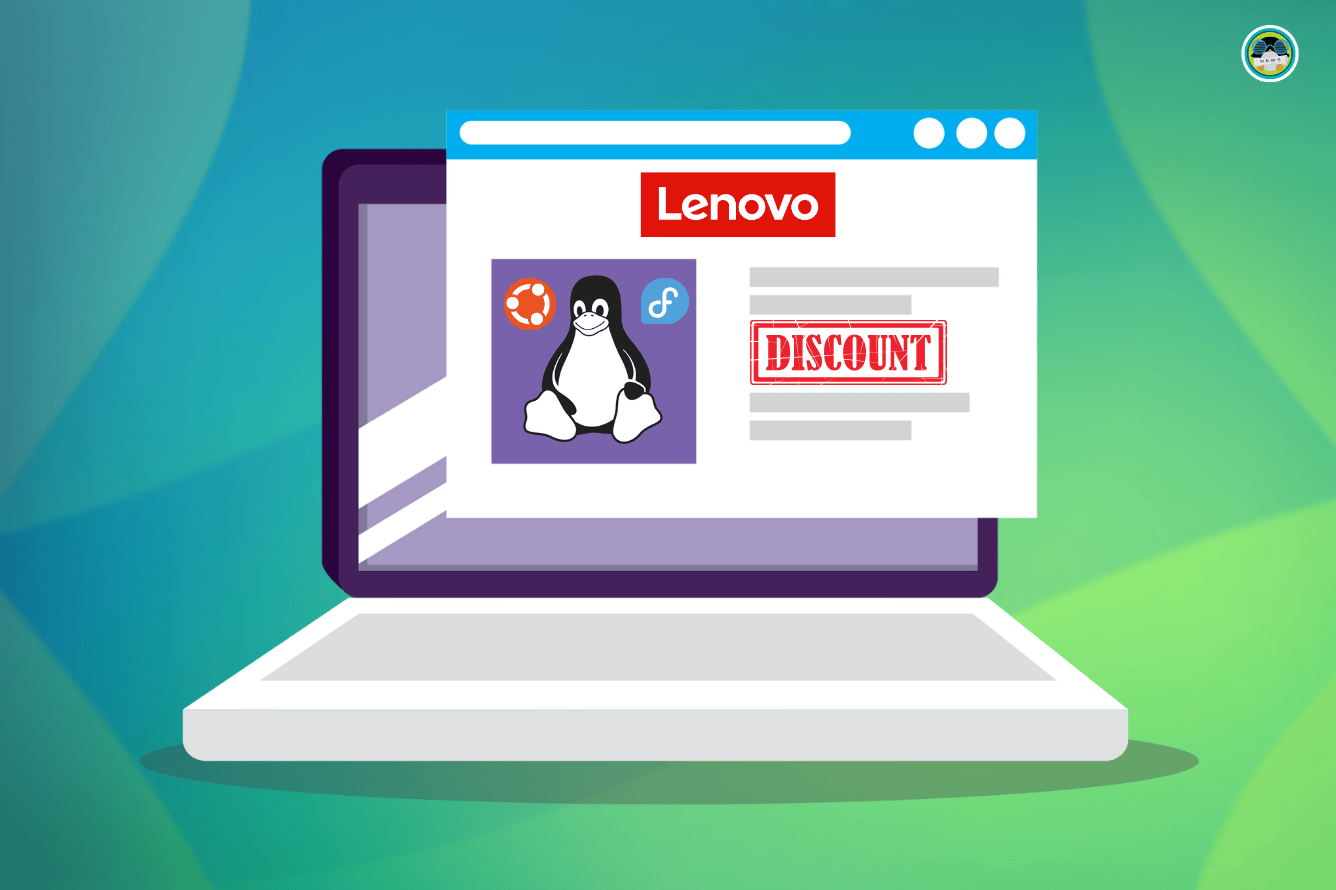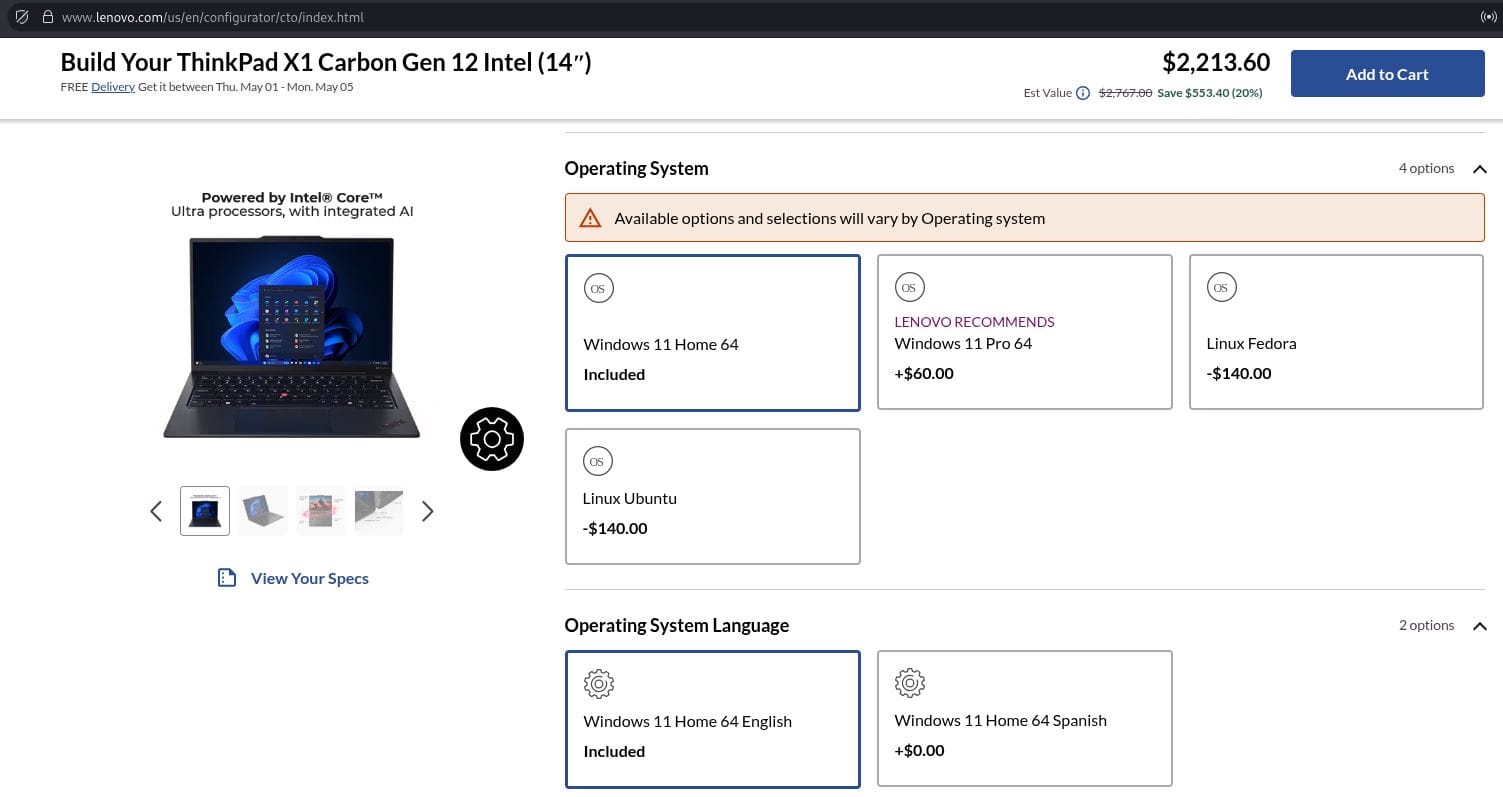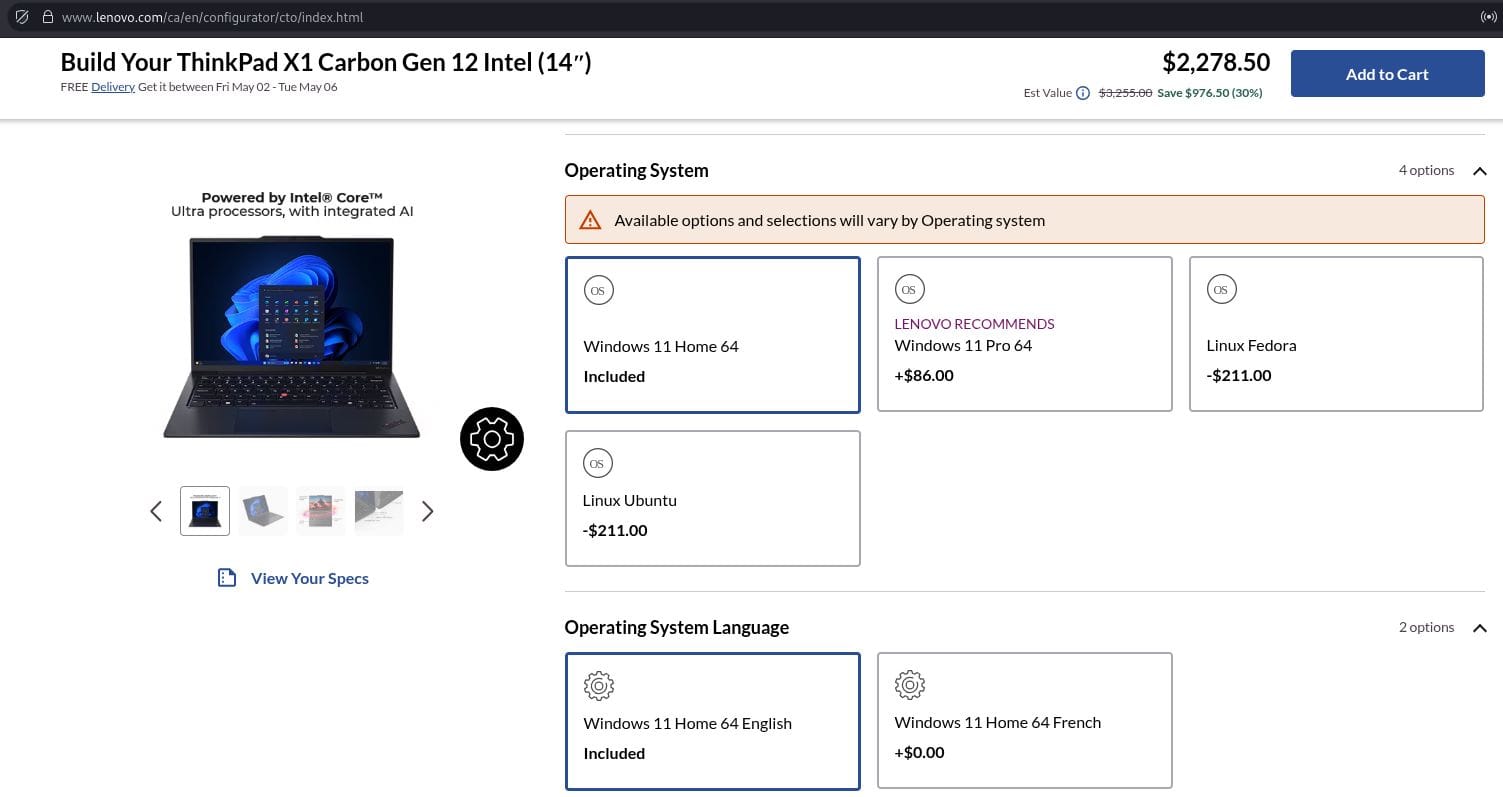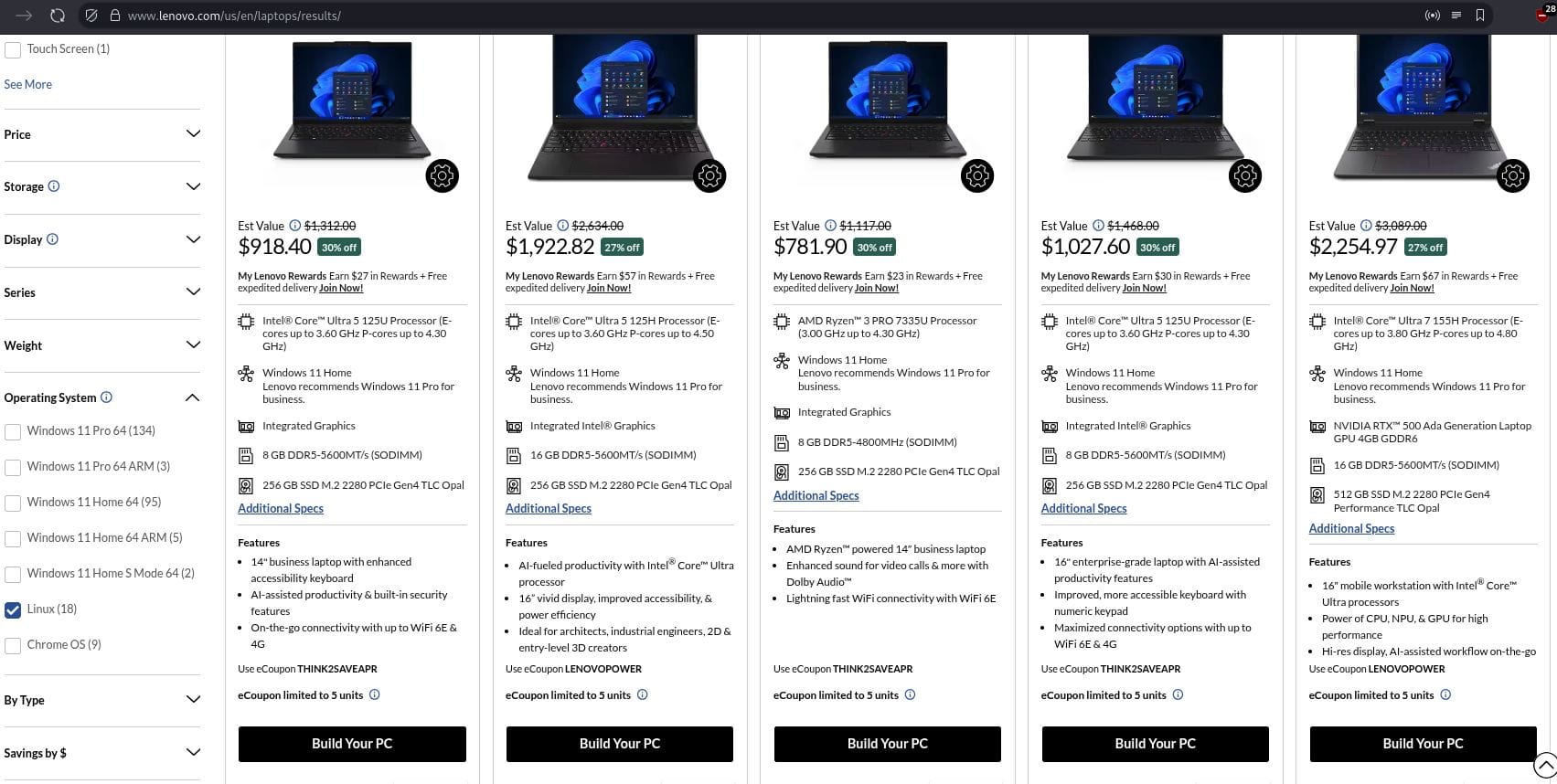cross-posted from: https://rss.ponder.cat/post/165736
At least in the U.S. and Canada, that is.
This was brought to my attention thanks to a Reddit post where a user (presumably a resident of Canada), had posted how Lenovo was shipping laptops with Fedora and Ubuntu at a cheaper price compared to their Windows-equipped counterparts.
Others then chimed in, saying that Lenovo has been doing this since at least 2020 and that the big price difference shows how ridiculous Windows’ pricing is.
Cutting the Windows Tax
When I dug in further, I found out that the US and Canadian websites for Lenovo offered U.S. $140 and CAD $211 off on the same ThinkPad X1 Carbon model when choosing any one of the Linux-based alternatives.
US pricing on left, Canadian pricing on right.
Interestingly, while the difference in pricing is noticeable, your mileage may vary if you are looking for such laptops on the official website. Not all models from their laptop lineup, like ThinkPad, Yoga, Legion, LOQ, etc., feature an option to get Linux pre-installed during the checkout process.
Luckily, there is an easy way to filter through the numerous laptops. Just go to the laptops section (U.S.) on the Lenovo website and turn on the “Operating System” filter under the Filter by specs sidebar menu.
Yes, it’s as simple as that. You can do the same for the various official online regional storefronts that Lenovo runs to see whether Linux-based operating systems are being offered on their laptops in your country.
Closing Thoughts
It is good to see that Lenovo is offering Linux in its laptops. In fact, there is another big-name laptop manufacturer, Dell, who also does something similar with its Ubuntu-certified laptops, but both have the same constraint of having limited options for buyers.
Also, as far as I know, Dell doesn’t reduce the pricing if you choose Linux instead of Windows. Correct me if I am wrong in the comments.
Nonetheless, I think these manufacturers could do a better job in marketing these Linux-based alternative operating systems to general consumers, showing them how they can save big when opting for these instead of the pricey and bloated Windows.
Otherwise, we might have to start observing Windows Refund Day again.
💬 Your take on this? Would mainstream users benefit from having Linux pre-installed on their laptops?
From It’s FOSS News via this RSS feed
Year of the Linux desktop is here! /s
Hopefully they start selling the Linux version in my country ngl
It kinda blows my mind that “no OS” isn’t the cheapest option
It’s the same reason that you have to pay more to stream videos without ads…
Stremio doesn’t charge me more. I dont know why anyone would pay to stream. Or not block ads.
Well, these services do require money to run. If everyone were as ‘clever’ as you are then we’d have little content indeed.
Yeah, smart TVs with no OS are way more expensive than the ones riddled with ads as well.
I changed to the projectivity launcher on my Android TV and it was night and day in terms of performance. No ads. The UI doesn’t change every other week to make me look at some new show I don’t care about. I can literally just hide everything I don’t want to see.
I should probably look into actual entire OS swaps available for my TV but I don’t have the time. Changing the launcher and using ADB (over lan) to disable updates and apply some optimizations was worth the day it took me.
Turns out the hardware on the TV is fine. The software was just complete garbage and got worse with every update.
Now if only I could fix the UI in the actual apps like YouTube. But still it’s a lot better. I’ll probably install the YouTube alternative app one day when I have time.
My wife started using the TV over her tablet after I changed it. She said she hated how slow it was to just turn on and start that she just would go to her tablet instead.
Yeah, out of the box experience is terrible. I wish we could’ve installed custom ROMs on TVs too but most of them are vendor-locked. Projectivity Launcher is a life saver. Default everything is just bad. I did a similar thing and removed many apps via ADB.
For Youtube alternative, SmartTube is the best. You can sideload it via ADB.
Nice. I don’t think I saw SmartTube before. Will check it out. Thanks.
So… Windows is an ad delivery system.hmm, it makes sense, because as an operating system that’s the only thing it does well is show ads.
If they could ship a computer with the option upon first boot of Windows, Linux, or no OS without having to pay license costs of Windows that would be fine, but that’s not how it works. 99% of people want Windows. Any laptop shipping with no os would just be sent back a few months later after sitting on the shelves for a few months.
No way thats 99%
I seem to recall in the past Microsoft pressured manufacturers to not sell computers without an operating system, arguing that unscrupulous consumers would install pirated copies of Windows on them. A ridiculous argument, but it was the excuse they used.
Sweet!
Nice!
Cool!
Fantastic development. I got the “last year’s” model of a Lenovo Legion gaming laptop for work a few years ago bc it was one of the few affordable models that I could find at the time with a second m.2 slot. Expandable memory was a nice bonus. Love the keyboard, too. Been really happy with it. I run Kinoite on it.
Would mainstream users benefit from having Linux pre-installed on their laptops?
Installing Linux is the easiest part of switching to Linux. If Linux was 100% the same as Windows in terms of user experience, everyone would have switched to Linux by now
The problem is that people nowadays are just as tech incompetent as they were when the first computer came out. Instead of having a basic understanding of how to use a computer, they just memorize where do click in order to Start application x and do thing y. So the Moment you just slightly alter the workflow, they just lock up. Next time you are at a normie friends house, just try and put a link from their desktop into a folder with the same Name. I will bet my ass they will lock up the Moment the icon of that link has changed.
Well, yeah, the whole purpose of an icon is to make it easy to identify amongst a sea of similar things with words. I’m reasonably computer literate, but I’m also lazy as fuck, I don’t even bother looking for icons I just crtl+alt+t and start it from the terminal.
I have a Linux gaming laptop and a windows laptop for proprietary crap. Or things that don’t run well on Linux. Like older games and iTunes.
If you only need iTunes for your iPod, there is a music manager alternative on Linux, its a GNOME app but I dont know the Name
For old games Theres ScummVM, and if its the DRM that wont work you might as well just pirate it, since you own the games anyway
Also I meant about 80% of all users, who only use it to browse the web and use some simple things like image viewers and stuff. For those people, Linux would be more than enough, if not even better because most software is OSS, but most of them just don’t want to learn how a computer works, and instead just opt for the method I just described
For iTunes, I do full backups and redeploys of my wife’s iPhone.
As for games, “yarr harr me matey.” I just don’t want to fiddle with wine or proton, so I’ll take a look at scummVM. We’re talking dos and w95 era shit. Likeech warrior 2, etc…
And I agree with your bottom portion, I don’t know a single person outside of myself (in my family) that needs more than a Chromebook or Linux mint with just the Firefox or chrome icon on the desktop.
2025 is the year of the Linux
desktoplaptop!I would really like to see broad support for TPM-backed FDE, which also requires secure boot to work to implement this properly.
For me, this is essential to have for feature parity with Windows on laptop.
other distributions should start having an option for this in the GUI installer, but it might be tricky for the average user
Arch Wiki has a guide on FDE using the TPM and it’s transparent in my everyday usage
some minor issues I see are:
- Secure Boot needing to be disabled then re-enabled during install for it to work as intended
- needing to write down a long backup passphrase, but this also happens on Windows and MacOS iirc
One major obstacle is third party drivers, specifically Nvidia, that forces building and signing your own kernel modules. It can be done, but it’s certainly more complexity than distributing signed binary drivers from the distro. I think Ubuntu has preliminary support for TPM-backed FDE, but only if you aren’t using such drivers. It doesn’t work in combination.
I don’t want to sign my own modules. I want them to shipped signed, so the key isn’t expected to be on my machine. If I were doing kernel development work, I’d have disabled secure boot entirely anyway.
Let’s not have tpm at all instead.
Since installing Linux, my battery life has more than doubled.
That alone is reason enough to switch to Linux
Yeah, while I don’t have a laptop myself, I installed Fedora on my desktop and it idles quieter. I suspect it’s not doing as much in the background as Windows was.
Computer companies tried that for a while like 15 years ago, too.
The timing here with compatability getting better could be a huge difference maker.
Absolutely. I’m just saying its not a novel idea.
Except now you don’t need to run proprietary software. Everything is online. If Chromebooks work for 90% of users, Linux will work for even more.
Next headline: “Lenovo discontinues offering Linux laptops due to minuscule sales and almost as many returns”
You’re really underestimating how similar windows 11 and Ubuntu are for average end users
deleted by creator
My parents never noticed. It’s only younger generations who are heavily invested in the branding.
Actual usage is much the same.
deleted by creator
Not really. Most people under 25 grew up on Chromebooks, not windows. Most people over 25 that aren’t tech savvy have been systematically moved to exclusively use web apps for whatever thing they’re doing. And based on browser numbers they can recognize a chrome logo to click on.
Anyone even slightly tech savvy, and I’m including people that use a computer for anything other than web based apps as tech savvy, has heard of Linux and can figure out what pretty icon to click on.
This isn’t 1994, Ubuntu was made for the iPhone generation, windows 11 was made for the iPhone generation. They’re both babby mode oses for people that think google is a program.
That’s wrong, sorry. More people are more computer literate now than at any point in history since computers are a significant part of almost everyone’s life now.
The “problem” with Linux is that even if it was as easy to use as Windows, which it definitely is not even close, it doesn’t support most of the most frequently used software that people use, from productivity to gaming. It’s making strides in gaming at least, but until valve gets a solution for all the anti-cheat stuff, it will never get off the ground. Fortnite? No Linux. COD? No Linux.
For productivity the alternatives to all the MS software range from “possibly as good as or better” to “definitely noticeably worse”, but the biggest problem is the fact that the interconnectivity between all the apps and other products isn’t there. Microsoft have insanely granular integration across almost all of their products, and people’s workflows often depend on it. Not to mention the thousands of other programs that are Windows only.
Most people over 25 that aren’t tech savvy have been moved to exclusively use web apps
Nah, not true at all, especially not in the corporate or business world.
The numbers don’t lie. No matter how many people know about Linux, they just don’t want to use it. It makes almost everything needlessly harder than it needs to be for them.
What decade did you step out of? These arguments stopped being true last decade. None of these arguments have been even slightly true since the pandemic.
deleted by creator
MS Office runs just fine, libre office is also fine for the vast majority of use cases, and of course you can play call of duty. The only thing kernel level anticheat does is make the installation of a game take longer with a few more steps; and most companies are realizing that given the demand from the steam deck.
Since the pandemic? Huh? You think everyone switched to web apps since the pandemic? Based on what and why?
Seriously, I’m struggling to understand what out of what we’re talking about has anything to do with the pandemic lol
Which arguments stopped being true last decade?
…why did the single most transformative event in terms of working from home on non work supplied devices change how companies deploy apps?
That obvious question and answer aside, everything has been moving from installed apps to web apps over the last decade. Office365 was the nail in the coffin for traditionally deployed applications, as now businesses didn’t need to update a hundred thousand deployments, just have them login in like they have always done. Not to mention web apps also tend to work on phones and tablets without any addition development work or training.
Have you just been out of it for the last decade or what? Have you just been out of a job for that entire time? Especially with how we assembly has been developed there are exceedingly few cases where you need to have anything but a browser installed for work. I’ve been with three companies in the last 5 years. The only system requirements was a chrome browser and fast enough hard lines internet. Two of those companies were fortune 100, so its not like this is just happening with startups using SaaS providers to cut down on costs.
I like they give the option!
Since I am dualbooting just to be able to check if it is a software issue or not in. Then i dont know what I would choose. Mainly use Linux. It is fun when I figure out the headset problem is a cable were the connections are 20 cm away from each other since it is hanging from the table.
Awesome, with Ubuntu too!
I’m in the UK, and last year got a Lenovo ThinkPad laptop with Linux pre-installed that was cheaper than the Windows equivalent. I had a choice of RAM, SSD, display and OS. Ubuntu was the only choice of Linux, though.
How much does an OEM windows cost these days?
2 pints if you’re Peter Thiel’s blood type.
Your in luck, Thiel is a universal reciver
Weird, I didn’t peg him as a bottom.
My plan is working nicely, next laptop will be a Lenovo
I have been running popos on my x1 for some years now. Only had problems with audio not working from one day to another, but other than that it has great support from Lenovo. Even the 4G modem has privat official drivers.
Similar experience with Fedora on a P14s. Everything just works, including the fingerprint reader.
A step in the right direction. If they don’t offer a price difference, they can keep it.
We need better and longer term uefi/bios support as IBM/lenovo used to have systems that specifically prevent uefi Linux installs from booting.
That trust was broken then, they do not have it now.















